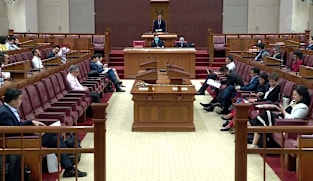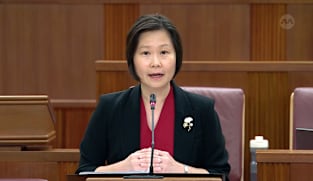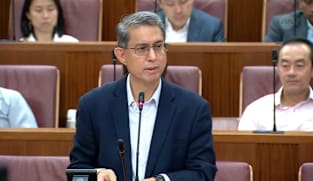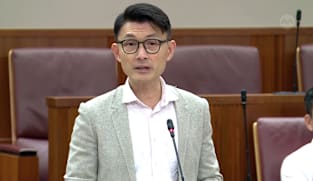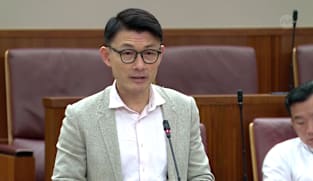K Shanmugam on Penal Code (Amendment) Bill
The courts have recognised that Parliament, as the elected branch of Government, is better suited to resolve difficult societal issues, said Home Affairs and Law Minister K Shanmugam. In Parliament, there can be consultation, discussion and debate, he said. Considerations going well beyond the law can be taken into account whereas the courts can only consider the legal issues, he added. In Parliament, consensus can be forged to bridge divergent viewpoints, while open-ended resolutions are possible, instead of binary, win-lose outcomes, he added. Speaking in Parliament on Monday (Nov 28), he highlighted Section 377A of the Penal Code, which criminalises sex between men, as an example. Mr Shanmugam said Singapore proposed to repeal Section 377A as it is the right thing to do, and society is more ready now for the repeal. He said Section 377A should "no longer be in our books" but there must be steps to deal with the possible consequences of the repeal, where some consequential effects would be unacceptable to a significant section of society. He said there is a legal risk that the courts will strike down Section 377A if it is left alone. Mr Shanmugam said if Parliament does not do what it has to do, then the courts will have to do what they do not want to do. "If we see a risk that a law may be found unconstitutional, it is our duty to act and deal with it in Parliament, both because it is our duty to do so and because taking the easy way out would have serious negative consequences for our society. It will be very bad for Singapore," he said. Mr Shanmugam pointed out that court processes are adversarial by nature. Their decisions are binary and zero-sum game, with no middle ground and no balancing of competing interests, he added. He said the courts cannot consider the competing social norms and social consequences of their decisions. If they strike down Section 377A, they will do so without being able to consider the consequential effects of that decision on the definition of marriage, which will have a cascading effect, impacting laws on same-sex marriage, media content and housing policies, among others. If the Government and Parliament do not take responsibility and instead stand by and do nothing, then litigation could change Singapore's societal norms very quickly, he warned. "This is like a train approaching. Question is are we prepared to take the appropriate steps to save and safeguard what is important for our society, whether we have the courage of our conviction, which should be to do what is good for Singapore? So Mr Speaker, I say to all Members, let us do what is right, do our duty, what is expected of us in Parliament and take a path forward on this difficult issue."
The courts have recognised that Parliament, as the elected branch of Government, is better suited to resolve difficult societal issues, said Home Affairs and Law Minister K Shanmugam. In Parliament, there can be consultation, discussion and debate, he said. Considerations going well beyond the law can be taken into account whereas the courts can only consider the legal issues, he added. In Parliament, consensus can be forged to bridge divergent viewpoints, while open-ended resolutions are possible, instead of binary, win-lose outcomes, he added. Speaking in Parliament on Monday (Nov 28), he highlighted Section 377A of the Penal Code, which criminalises sex between men, as an example. Mr Shanmugam said Singapore proposed to repeal Section 377A as it is the right thing to do, and society is more ready now for the repeal. He said Section 377A should "no longer be in our books" but there must be steps to deal with the possible consequences of the repeal, where some consequential effects would be unacceptable to a significant section of society. He said there is a legal risk that the courts will strike down Section 377A if it is left alone. Mr Shanmugam said if Parliament does not do what it has to do, then the courts will have to do what they do not want to do. "If we see a risk that a law may be found unconstitutional, it is our duty to act and deal with it in Parliament, both because it is our duty to do so and because taking the easy way out would have serious negative consequences for our society. It will be very bad for Singapore," he said. Mr Shanmugam pointed out that court processes are adversarial by nature. Their decisions are binary and zero-sum game, with no middle ground and no balancing of competing interests, he added. He said the courts cannot consider the competing social norms and social consequences of their decisions. If they strike down Section 377A, they will do so without being able to consider the consequential effects of that decision on the definition of marriage, which will have a cascading effect, impacting laws on same-sex marriage, media content and housing policies, among others. If the Government and Parliament do not take responsibility and instead stand by and do nothing, then litigation could change Singapore's societal norms very quickly, he warned. "This is like a train approaching. Question is are we prepared to take the appropriate steps to save and safeguard what is important for our society, whether we have the courage of our conviction, which should be to do what is good for Singapore? So Mr Speaker, I say to all Members, let us do what is right, do our duty, what is expected of us in Parliament and take a path forward on this difficult issue."










